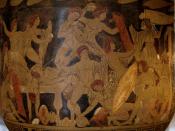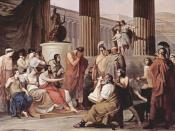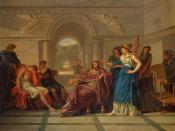Telemachus is often overshadowed by OdysseusÃÂ many heroic deeds and conquests; while Telemachus attempts to be just like his father, he never earns the full respect of those close to him and is never seen as a true figure of power or authority in othersÃÂ eyes or even in his own. In Book 2, the suitors mock Telemachus for his weakness and indecisiveness. Eurymachus writes off the omen of the fighting eagles, voicing his belief that Telemachus (whom he refers to as ÃÂthe boyÃÂ [l. 212]) cannot follow through with his ÃÂtiresome threatsÃÂ because he lacks the power to challenge the suitors. Later, Leocritus states that despite encouragement from the elders, Telemachus will never make the journey to uncover information about Odysseus; like Eurymachus, Leocritus doubts that Telemachus will act on his words. When Athena appears to Telemachus, she expresses her faith in him, which is apparently due only to the fact that he is OdysseusÃÂ son.
Possibly foreshadowing TelemachusÃÂ ultimate failure to emulate his father, she says, ÃÂFew sons are the equals of their fathers; most fall short.ÃÂ [l. 309-310]Consistent comparison to Odysseus leads even Telemachus to doubt his abilities.
He openly states that he does not believe himself to be anything like his father: ÃÂNow we have no man like Odysseus in command.ÃÂ [l. 63] Though he hopes to be as powerful leader of Ithaca that Odysseus had been twenty years ago, Telemachus feels as if he is inadequate for the role. This sense of failure causes Telemachus to have little faith in himself as a man; he refers to himself as ÃÂa boyÃÂ when addressing his peers. Through doing this, Telemachus perhaps hopes to imply that he still has room to grow into manhood and follow in his fatherÃÂs footsteps. TelemachusÃÂ struggle to imitate Odysseus is typical of the father-son conflict that is often present even today.
Bibliography:The Odyssey by Homer


